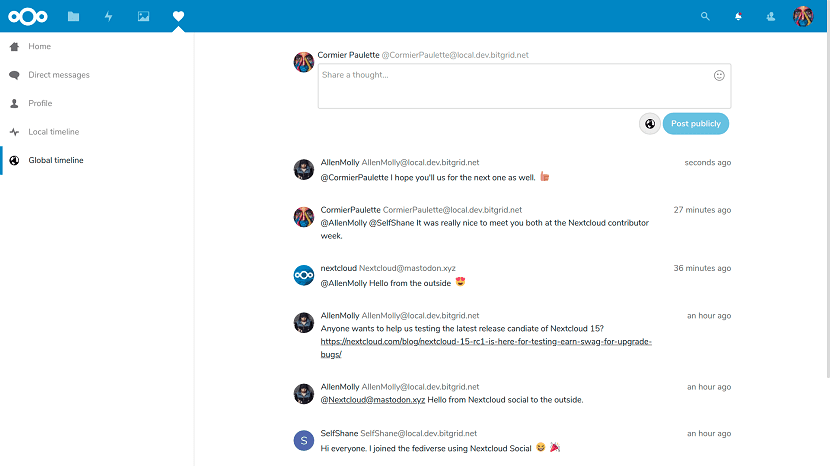
The release of the new version of Nextcloud 15 was recently announced, which is a fork of the ownCloud project, created by the main developers of the system.
Nextcloud and ownCloud allow anyone to implement cloud storage on their own computers or servers, have the support for synchronization and data exchange, as well as offer related functions, such as video conferencing, messaging and, from the current version, integration of functions to create a decentralized social network.
Nextcloud source code, like ownCloud, is distributed under the AGPL license.
Nextcloud provides tools for sharing, version control of changes, support for playing multimedia content and viewing documents directly from the web interface, the ability to synchronize data between different machines, the ability to view and edit data from any device anywhere on the network.
Access to data can be organized through the web interface or through the WebDAV protocol and its CardDAV and CalDAV extensions.
Unlike the Google Drive, Dropbox, Yandex.Disk and box.net services, the ownCloud and Nextcloud projects give the user complete control over their data: the information is not linked to external cloud storage systems, but that is hosted on user-controlled computers.
The key difference between Nextcloud from ownCloud is the intention to provide in a single open source all the advanced features previously provided only in the commercial version of ownCloud.
The Nextcloud server can be deployed on any hosting that supports the execution of PHP scripts and provides access to SQLite, MariaDB / MySQL, or PostgreSQL.
Main news of Nextcloud 15
With this new release of Nextcloud 15 added the ability to implement a decentralized social network that allows the exchange of messages, publish statuses, manage their channels and subscribe to other users' channels.
Nextcloud-based nodes can communicate with other hosts (for example, it can subscribe to messages from a user of a social network deployed on another server) and join global federated networks that link many individual social networks running on your own servers in a single space.
To interact with other decentralized networks, Nextcloud supports the ActivityPub protocol, which, for example, can be used to connect to networks based on the Mastodon and PeerTube platforms.

Nextcloud 15 can also be used to create corporate and private social networks They provide communication for employees of specific companies or communities.
On the other hand, the two-factor authentication mechanisms continued to improve.
In addition to the previously available methods to send a confirmation code via SMS, Signal, Telegram and NFC (Yubikey NEO), the new version adds the ability to confirm with a previously authenticated device (for example, you can confirm entry to the desktop client from a smartphone and vice versa).
Also added support for pre-generated one-time codes as keys that can be used when two-factor authentication cannot be passed.
Two-factor authentication can be enabled globally for all users, as well as for individual groups.
In addition, the integration with Collabora Online was improved for the organization of the joint remote work with the LibreOffice office suite through the Web.
Added a sidebar with video calls and chat, shown in the document editing process. Integrated version control support.
Support for HiDPI and the ability to display thumbnails in file list view was added in this new version, as well as the ability to edit documents and collaborate on documents from a mobile device.
Download Nextcloud 15
This new version of Nextcloud 15 It is now available for download and for this you must go to the official website of the project where you can get the application installer for your Linux distribution.